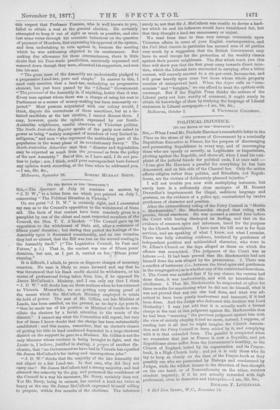fro THE EDITOR OF THE " SPEOTATOR•ul SIR,—The Spectator of
July 28 contains an answer, by 4' J. D. W.," to a letter from me which you printed on July 7, .concerning "The Political Situation in Victoria."
On one point "J. D. W." is certainly right, and I overstated my case as to the Council's opposition to the withdrawal of State aid. The facts of that contest have been concisely given in a pamphlet by one of the oldest and most respected members of the Council, the Hon. T. T. AlBecket. "The Council gave up its opposition to the withdrawal of State aid, after a resistance of fifteen years' duration ; but during that period the feelings of the Assembly upon it fluctuated considerably, and on one occasion they had so altered, that the Bill was lost on the second reading in the Assembly itself." (" The Legislative Council, its Past and Future," p. 6.) That is, the contest was one of fifteen years' -duration, but not, as I put it, carried on for "fifteen years' running."
It is difficult, I admit, to prove or disprove charges of monetary coercion. No man is likely to come forward and say that he was threatened that his Bank credit should be withdrawn, or his means of professional living taken from him, if he opposed Sir James McCulloch's Ministry, and I can only say that I think -" J. D. W." will doubt less on these matters when he has returned to Victoria. Meanwhile, we are getting very strong proof of the means which the McCulloch Ministry employed to retain its hold of power. The seat of Mr. Gillies, our late Minister of Lands, hae been assailed, on the ground, as to-day's Age puts it, 46 that he made use of his position as Minister of Lands to con- ciliate the electors by a lavish attention to the wants of the district." I cannot say what the Committee will report, but very few of those I know doubt that the charge has been substantially -established ; and this means, remember, that an elector's chance of getting his title to land confirmed depended in a large electoral district on the support he gave to a Minister. Mr. Gillies is not the only Minister whose conduct is being brought to light, and the Leader is, I believe, justified in stating, h propos of another dis- closure, that "no Government we have had in Victoria has equalled Sir James McCulloch's for daring and unscrupulous jobs."
"J. D. W." thinks that the majority of the late Assembly did not object to a fair Land-tax. In that case, why did they not carry one? Sir .James McCulloch had a strong majority, and had silenced the minority by the gag, and possessed the confidence of the Council in a way his successor, Mr. Berry, certainly does not. Yet Mr. Berry, being in earnest, has carried a land-tax twice as heavy as the one Sir James McCulloch expressed himself willing to propose, within five months of the elections. The inference surely is, not that Sir J. McCulloch was unable to devise a land- tax which he and his followers would have c onsidered fair, but that they thought a land-tax unnecessary or unjust.
We read from time to time very strange comments upon Victorian affairs in some of your English contemporaries, and the Pall Mall Gazette in particular has amused men of all parties very much by a suggestion that the British Government may have to send troops for the protection of the wealthy classes against their poorer neighbours. The files which reach you this time will show you that the first great essay towards direct taxa- tion, which the Liberals have succeeded in carrying after a bitter contest, will scarcely amount to a six-per-cent. Income-tax, and will press heavily upon none but those whose whole property consists of unimproved land. When the Argus calls us " com- munists " and "burglars," we can afford to treat the epithets with contempt. But if the English Press thinks the actions of the Liberal party out here worthy of comment, it ought surely to obtain its knowledge of them by studying the language of Liberal statesmen in Liberal newspapers.—I am, Sir, &c.,






































 Previous page
Previous page